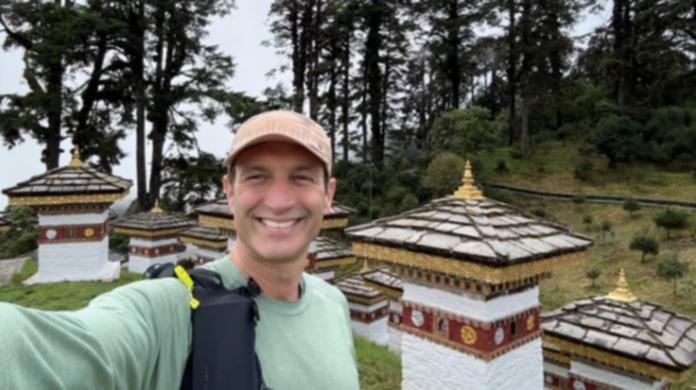This Stanford professor went to Bhutan to learn about happiness. Here’s his No.1 takeaway

In October 2024, Gutman went on a three-week journey through the South Asian country of Bhutan, officially known as the Kingdom of Bhutan, located on the eastern ridges of the Himalayas. Gutman trekked through the mountains alongside academics, clergy and locals.
Journeying through Bhutan
The Kingdom of Bhutan, sandwiched between two of the world’s most populous countries, India and China, is known for its governing principle of prioritizing human happiness and well-being over economic development.
Sign up to The Nightly's newsletters.
Get the first look at the digital newspaper, curated daily stories and breaking headlines delivered to your inbox.
By continuing you agree to our Terms and Privacy Policy.The idea of “Gross National Happiness” was coined in the 1970s by Bhutan’s fourth king, Jigme Singye Wangchuck, who said that “Gross National Happiness is more important than Gross Domestic Product,” according to a 2024 publication by the OECD.
“Going deep into understanding happiness led me to research Bhutan, because they put an emphasis on this,” Gutman told CNBC Make It.
“It made me want to understand it from their vantage point, right? So, [I wanted] to go and listen to them, to the people that have been getting this knowledge, from generation to generation for many [years],” he said.
Because Bhutan is located in the Himalayas, most of the trip was spent climbing. Gutman travelled primarily by foot or by local transportation from about 1,000 feet in elevation to almost 14,000 feet, he said. Throughout the journey, he was immersed in the country’s famously breathtaking landscape.
Bhutan places a big emphasis on environmental sustainability and conservation. It is the first “carbon-negative” country in the world, largely helped by its vast forests covering over 70% of its land, according to a 2023 report.
The country is in “a bubble of tradition,” he said. “They’re very mindful of nature, very protective of nature... It’s sacred for them. You can’t cut a tree without getting a very special permit.”
Many local Bhutanese people view their lives as not just being connected to nature, but being from nature itself, said Gutman.

The key to happiness: simplicity
So, what is the key to human happiness? Gutman would say that the answer is simple — it is to simplify.
“The more I progress in the research of happiness, the more I personally understand it better, the more I connect it to mindfulness,” Gutman said.
He discovered during his trip, by observing the local people and through his conversations with the local clergy, that happiness is connected to mindfulness, which can be found in nature.
“In modern culture, we’re very concentrated on what’s happening outside. There’s a lot of stimulus that is coming at us ... at some point, we become almost prisoners of that,” said Gutman. “Nature creates the exact opposite ... nature is just there, it just happens.”
“When nature is just happening, you have an opportunity to understand that your consciousness is just happening as a result of that. Basically, consciousness — and this is a big ‘aha moment’ that I had — is empty too,” he said.
Gutman calls it the “empty self.” He learned that just as nature is calm, human consciousness is calm. Whether you are laying in the grass by a remote lake, or running between meetings in a big city, who you are, and what your consciousness is, doesn’t change.
“We basically choose to get stressed by all these sensory emotions... [because] actually, the inside of us is calm and empty, right? Nature helps see that and understand that,” he said.
Bhutan’s challenges
But not everything is rosy — Bhutan has its fair share of challenges.
The country left the United Nations’ Least Developed Countries category just last December. Its gross domestic product per capita per year was about $3,700 as of 2022, according to World Bank data.
“We look at it as maybe poverty — low GDP,” Gutman said. “It’s not an easy life because these are not wealthy people, but they’re happy.”
The Bhutanese government is working to strengthen the economy while continuing to balance the country’s guiding principles of environmental sustainability — through measures such as a daily tourism fee — and “Gross National Happiness.” Gutman looks at the country as an example of how to develop without losing “ancient wisdom” built over many years.
In many Western and developed countries, people are often in a rush — not just in everyday life, but also in the way they innovate and develop economically.
“When we rush towards the innovation, the new thing, doing things faster, better, easier, cheaper ... The thing is, we forget to take with us this very solid foundation that keeps the core very strong. So we’re building a little bit on water,” he said.
“And I think what Bhutanese are doing really well ... is keeping that strong core of beliefs, of morals, of ethics, of mindfulness as the foundation of how they make progress,” he said. “So progress is, sure, slower, but more solid, right? And, I think that’s something to learn from them.”
Originally published on CNBC
